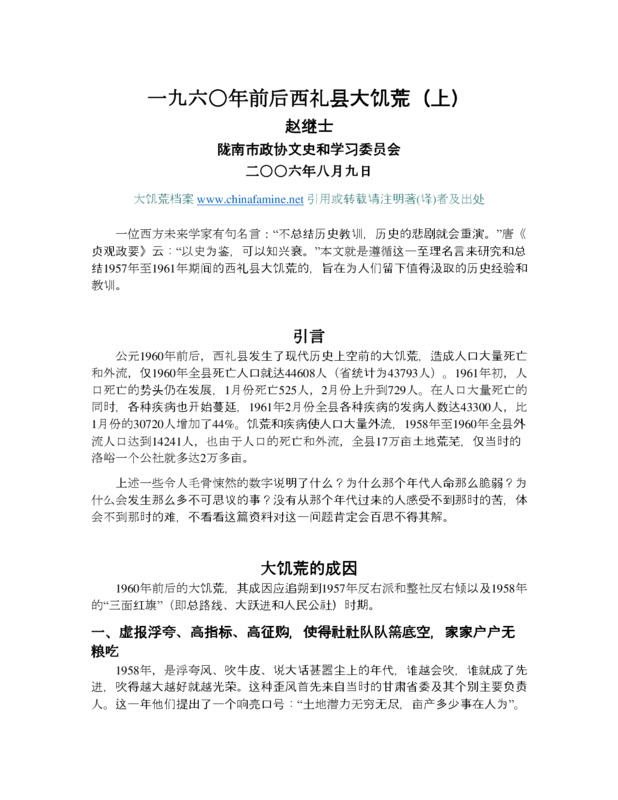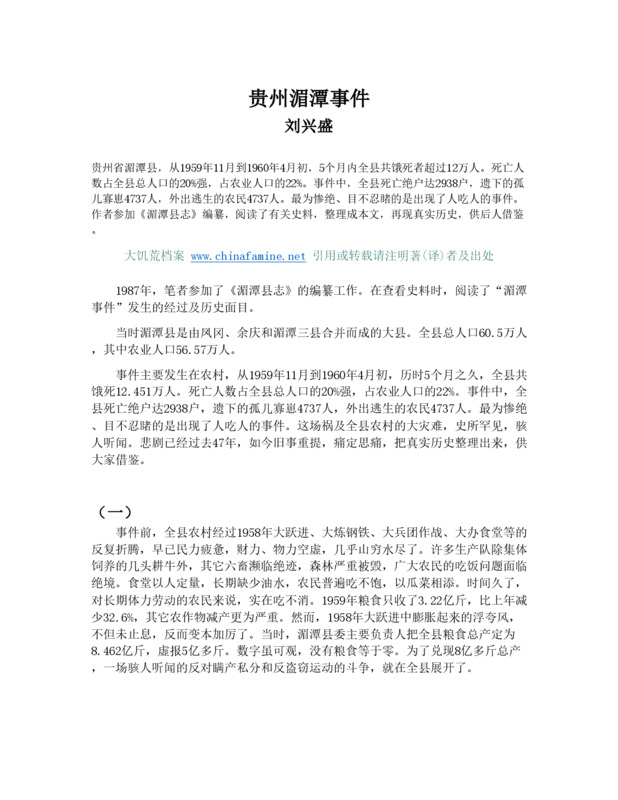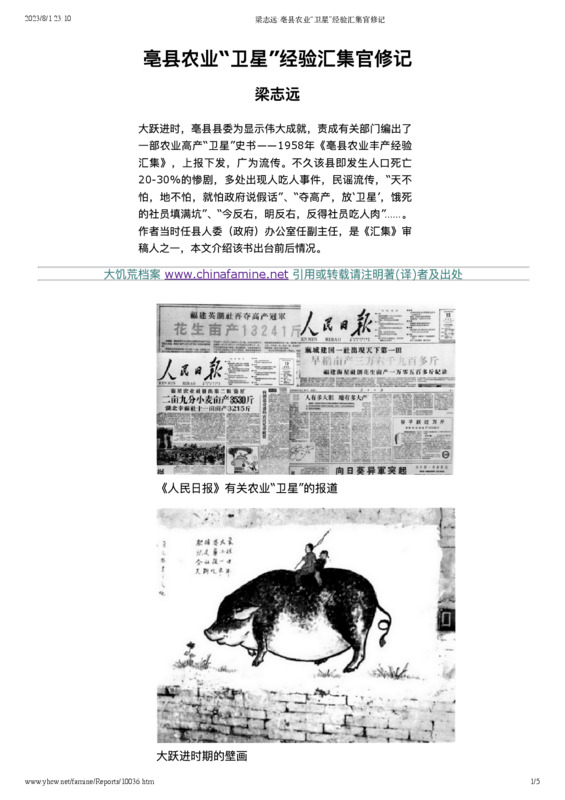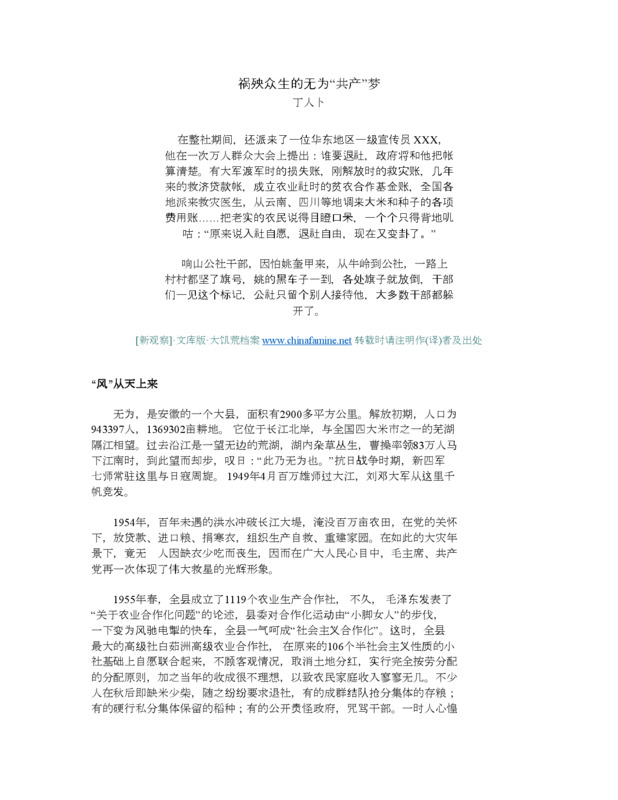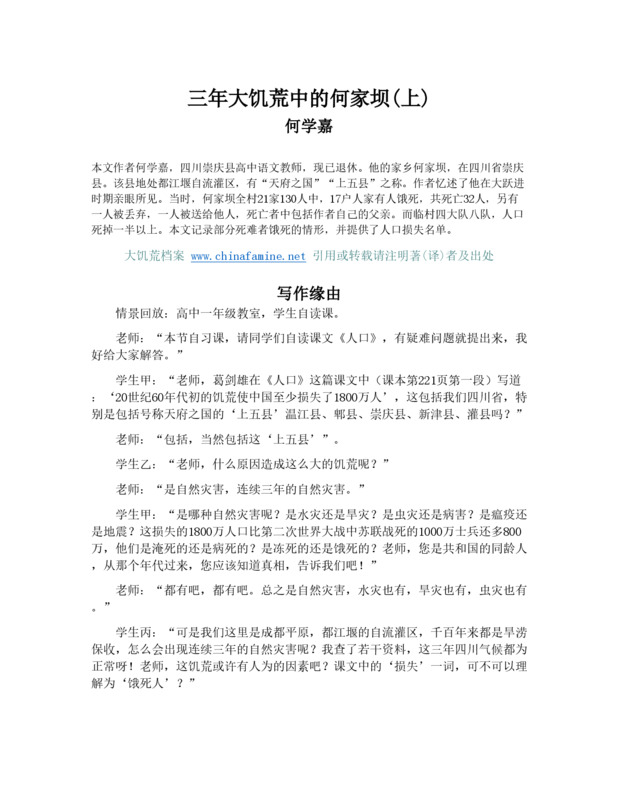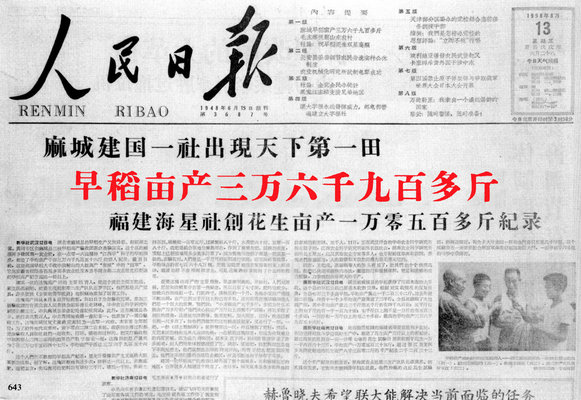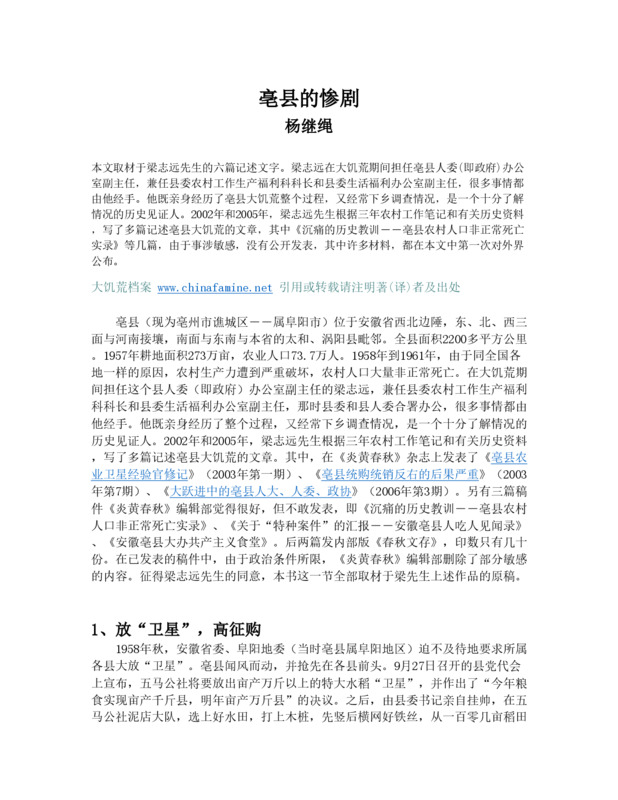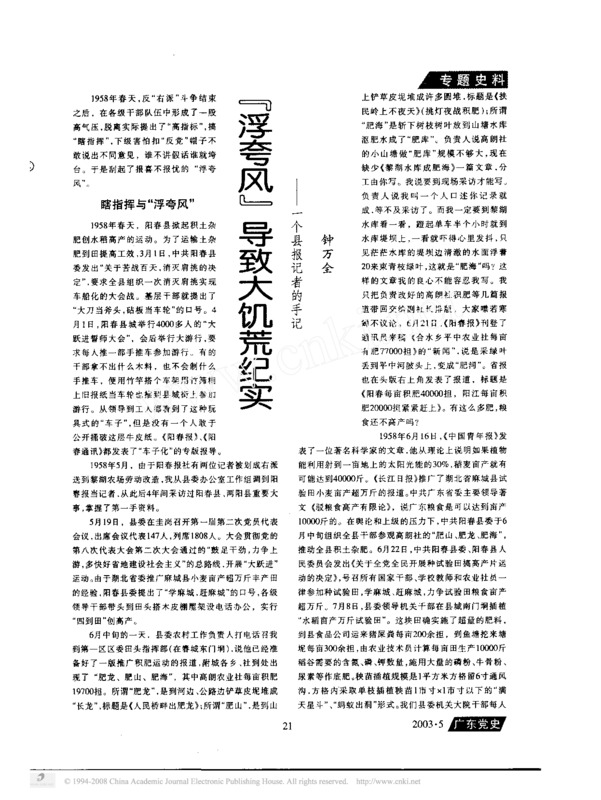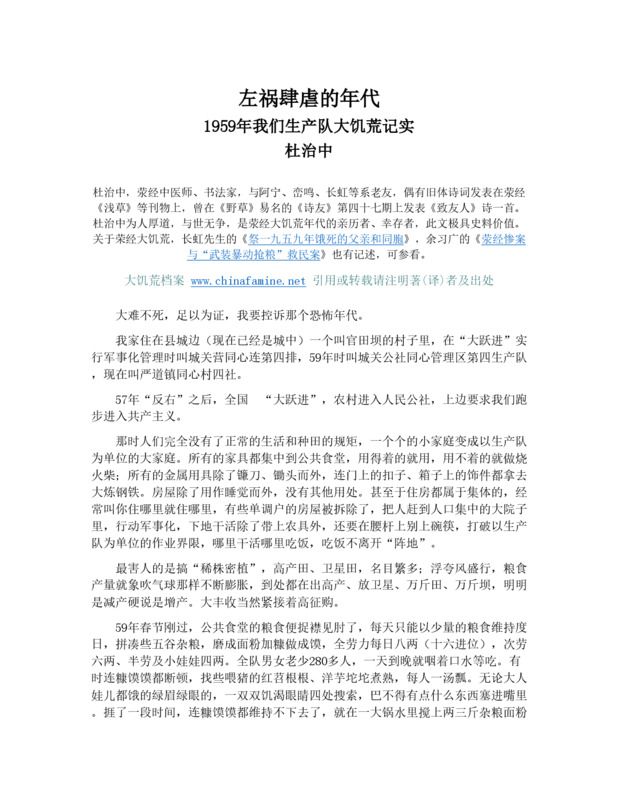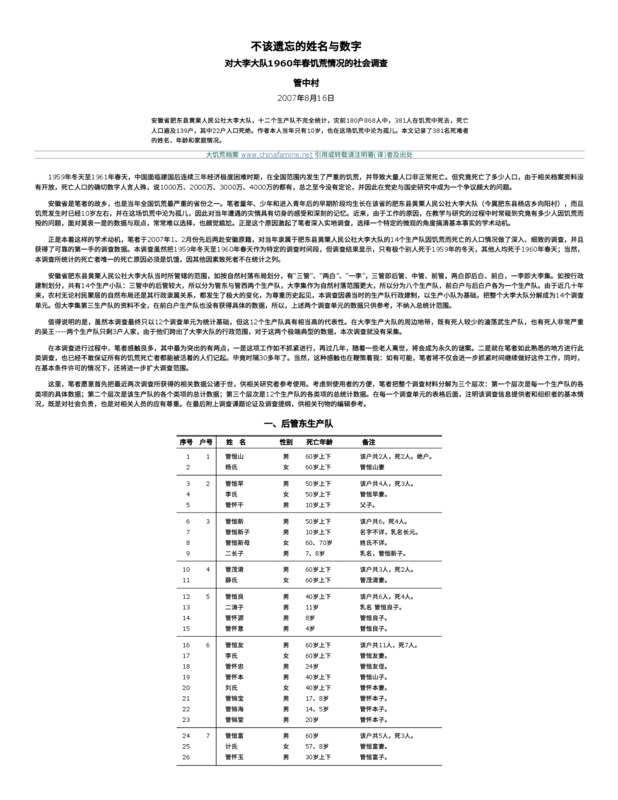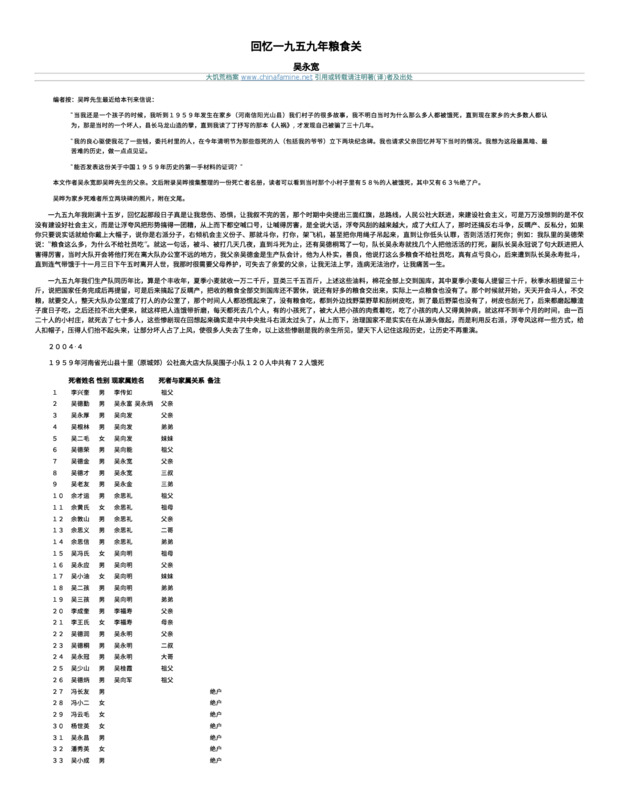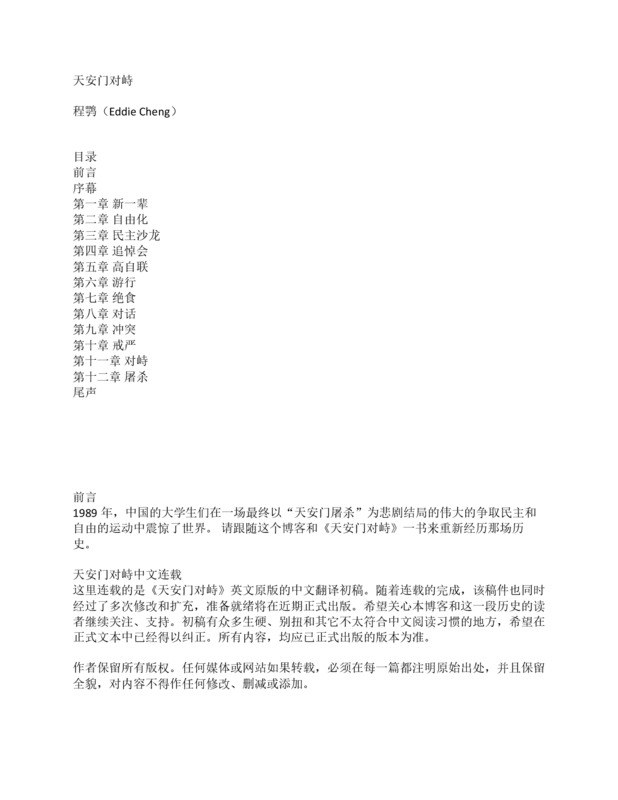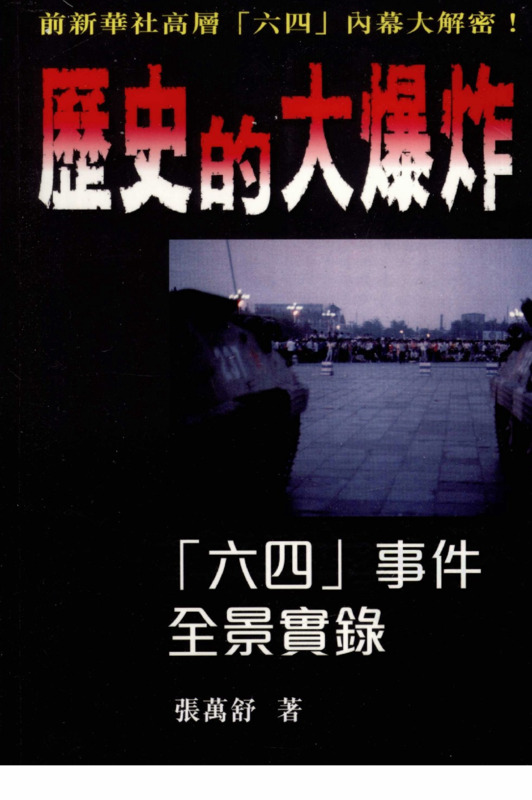Explore the collection
Showing 201 items in the collection
201 items
Periodicals
Spark, Issue 1
<i>Spark</i> was an underground magazine that appeared in the Tianshui area of Gansu Province in northwestern China during the 1959-1961 Great Famine. The magazine was lost for decades but in the late 1990s began to be republished electronically, becoming the basis of documentary films, essays, and books.
In 1959, the Great Famine was spreading across China. It was witnessed by a group of Lanzhou University students who had been branded as Rightists and sent down to labor in the rural area of Tianshui. They saw countless peasants dying of hunger, and witnessed cannibalism.
Led by Zhang Chunyuan, a history student at Lanzhou University, they founded <i>Spark</i> in the hope of alerting people to the unfolding disaster and analyzing its root causes. The students pooled their money to buy a mimeograph machine, carved their own wax plates, and printed the first issue. The thirty-page publication featured Lin Zhao's long poem, "A Day in Prometheus's Passion." The first issue also featured articles, such as "The Current Situation and Duty," which dissected the tragic situation of society at that time and hoped that the revolution would be initiated by the Communist Party from within.
The students planned to send the magazine to the leaders of the provinces and cities with a view to correcting their mistakes. But before the first issue of Spark was mailed and while the second issue was still being edited, on September 30, 1960, these students in Wushan and Tianshui were arrested, along with dozens of local peasants who knew and supported them. Among them: Zhang Chunyuan was sentenced to life imprisonment and later executed; Du Yinghua, deputy secretary of the Wushan County Committee of the Chinese Communist Party, was sentenced to five years' imprisonment for having interacted with the students, and later executed. Lin Zhao was detained and also executed. Other key members, such as Gu Yan, Tan Chanxue, and Xiang Chengjian, were all sentenced to long years in labor camps.
In the 1990s, Tan Chanxue devoted herself to researching historical information and figures to bring this history to life. She found in her personnel file (<i>dan'an</i>)photographs of the magazine, as well as self-confessions and other evidence used in the students' trial. Eventually, the photos were collated into PDFs, which began to circulate around China.
Editors' note: This site the original handwritten version and a PDF of all the articles from the first issue of <i>Spark</i>. We will also make available transcripts of the essays in Chinese and are searching for volunteers to translate the texts into English. Please contact us if you're interested in helping!
Article
Special Collections |Famine and Counties (7): The Great Famine in Xili County around 1960
Around 1960, Xili County experienced a famine unprecedented in modern history, resulting in massive population deaths and an exodus, with 44,608 deaths in the county in 1960 alone (43,793 according to provincial statistics). In early 1961, the momentum of population deaths continued to develop, with 525 deaths in January, rising to 729 in February. Along with the massive population deaths, various diseases began to spread. Famine and disease caused a massive exodus of population. From 1958 to 1960 the exodus of population from the county reached 14,241 people. Also due to the death and exodus of population, 170,000 acres of land in the county were left barren, only one commune of Luoyu at that time had more than 20,000 acres.
Article
Special Collections |Famine and County (2): Guizhou Meitan Incident
In Meitan County, Guizhou Province, from November 1959 to early April 1960, more than 120,000 people starved to death in five months. The deaths accounted for more than 20 percent of the county's total population and 22 percent of the agricultural population. During the incident, 2,938 families died in the county, 4,737 orphans and widows were left behind, and 4,737 peasants went out to escape. The most tragic and horrible thing to witness was incidents of cannibalism. The author participated in the compilation of "Meitan County Records," read the relevant historical materials, and organized this article to reproduce the real history for future generations to learn from.
Article
Special Collections |Famine and the county (5): Haoxian agricultural "satellite" experience collection official repair collection
The former Bo County (now Qiaocheng District, Bozhou City) in Anhui Province is located in the plains of northwest Anhui. During the Great Leap Forward in 1958, under the slogan of "how bold people are, how productive the land is," in Bo County, like everywhere else, generally produced agricultural high-yield "satellites." Afterwards, to show the great achievement, the county party committee instructed the relevant departments to compile a high agricultural yield "satellite" history book - 1958, <i>Bo County Agricultural Yield Experience Collection</i>, that was reported to the press and widely circulated. At that time, I served as deputy director of the county people's committee (government) office and was appointed by the county party committee as one of the reviewers. Now I would like to introduce the incredible circumstances for future generations with the the introduction of the history book *Collection*.
Article
Special collections |Famine and the County (6): The "Communist" Dream of Doing Nothing that Wreaks Havoc on the People
During the period of reorganization of the commune, a first-class propagandist from East China was sent to the commune. At a mass meeting of 10,000 people, he proposed that whoever wanted to withdraw from the society, the government would settle accounts with him. There was an account of the losses incurred when the army crossed the border; an account of the disaster relief during the past few years, an account of the poor-peasant cooperative fund when the Agricultural Society was established; and the accounts of the various expenses incurred in sending disaster relief doctors from all over the country and transferring rice and seeds from Yunnan and Sichuan ...... The honest peasants were dumbfounded. Each one privately complained: "The original said that membership was voluntary and withdrawal was free, but now they have changed their minds."
Article
Special Collections |Famine and Village (1) Hejiaba in the Three-Year Famine
At the time of its writing, the author of this article, He Xuejia, was a retired high school language teacher in Chongqing County, Sichuan Province. His hometown, Hejiaba, is in Chongqing County, Sichuan Province. The county is located in the Dujiangyan Artesian Irrigation District and is known as the "Land of Heavenly Capital" and the "Upper Five Counties." The author recalls what he witnessed during the Great Leap Forward. At that time, Hejiaba village had 21 families of 130 people. 17 families starved to death, a total of 32 deaths, another person was abandoned, one was given to others, the deaths include the author's own father. As for the four major teams and eight teams in the adjacent village, more than half of the population died. This paper documents some of the deaths from starvation and provides a list of population losses.
Article
Special Collections|Famine and Village (2) The People's Commune Canteen in Zhoujiawan
"In the second month of the 1961 lunar calendar, the communal canteen was disbanded. The houses and pigsties of the members were compensated and returned. The land was set aside, and the rations were supplied. So we gradually got through the difficult times. Some said that if the communal canteens had been organized for a few more years, I wonder how many more people would have died. "This is the personal experience and oral account of a farmer in Yingshan County, Sichuan Province.
Article
Special Feature|Famine and County (3): Hao County's Tragedy
This article is taken from six accounts by Mr. Liang Zhiyuan. Mr. Liang Zhiyuan was the deputy director of the Bo County People's Committee (i.e., the government) office during the Great Famine. He also served as the head of the Production and Welfare Section of the County Party Committee's Rural Work Department and the deputy director of the County Party Committee's Living and Welfare Office, where he was responsible for a lot of things. In 2002 and 2005, based on three years of rural work notes and relevant historical information, Mr. Liang Zhiyuan wrote a number of articles describing the Bo County famine, including "A Painful Lesson in History - The Unnatural Deaths of the Rural Population in Bo County." and several other articles. Due to the sensitivity of the matter, these have not been published publicly, and many of these materials are released to the outside world for the first time in this article.
Article
Special Features|Famine and the County (4): Chronicle of the Great Famine caused by pompous winds
Guangdong Liangyang County was formed in 1958 by the merger of Yangjiang and Yangchun counties. This article describes the ins and outs of excess and famine in Liangyang County.
Article
Specials Collections| Famine and the Village (4) The Year of the Raging Left Scourge
The author of this article, whose hometown is the fourth team of Guantianba in Sichuan Province, experienced the Great Famine and witnessed one of his fellow villagers die of starvation. He records how people struggled to survive the famine and records each of the names of those who died of starvation in the hope that future generations will always remember them.
Article
Specials Collections| Famine and Village (4) Names and Numbers That Should Not Be Forgotten
Dali Brigade of Huangli People's Commune, Feidong County, Anhui Province, has twelve production teams. According to incomplete statistics, of the 868 people in 180 households before the disaster, 381 people died in the famine, and the death population spread over 139 households, of which 22 households were entirely annihilated. The author, Guan Zhongcun, who was only 10 years old at the time, was also orphaned during the famine. This article records the names, ages, and families of the 381 people who died.
Article
Specials Collections| Famine and Village (6) Memories of the 1959 Grain Shutdown
In 1959, out of 120 people in Wu Weizi Squad of Gao Dadian Brigade, Shili Commune, Guangshan County, Henan Province, 72 people died of starvation. Author Wu Yongkuan witnessed the deaths of his father and his fellow villagers. His son, Wu Ye, collected and organized a list of the dead, and readers can see that, at that time, 58% of the people in that small village died of starvation, and 63% of families died off with no descendants.
Book
Stand off at Tiananmen
This book goes beyond the individual perspective of a memoir to recount the movement from the perspective of the student collective. It focuses on the vivid portrayal of characters and their interactions. As the author puts it, this is the first time that the 1989 pro-democracy movement and the June 4 tragedy are "recounted as a complete and coherent attempt at narrative history." This book was originally written in English and published in 2009 on the 20th anniversary of June Fourth. The author himself later translated it into Chinese and released it on the eve of June 4 this year. The author, Eddie Cheng, was originally a student in the Physics Department of Peking University in the class of '80. He caught up with the election campaign right after he entered the school. Later, he became an important organizer of the student movement, having spearheaded the two campus pro-democracy campaigns of '84 and '85. In 1986, he went to the United States to study abroad. Currently he resides in the US state of Colorado.
The book can be purchased <a href="https://www.amazon.com/dp/0982320302">here</a>.
Film and Video
Taishi Village
In the fall of 2005, residents of Taishi Village became increasingly frustrated and angered by the sale of land by village officials; hundreds of villagers signed a petition calling for the removal of the village chief. The villagers occupied the village committee’s financial office and expressed their demands through sit-ins and other forms of protests. The government dispatched the police to arrest village activists, but the villagers insisted on starting a formal recall process. The government finally sent a team to the village to verify the signatures for the petition.
<i>The Taishi Village</i> recall incident generated attention from Chinese and foreign media, and caused uneasiness among local government officials. On September 12, 2005, police arrested dozens of villagers who were participating in a sit-in in the village committee room. Despite the pressure, villagers elected a committee to remove the village committee director. The government then dispatched more men to exert pressure, forcing elected members to withdraw one by one. Hired patrol teams eventually drove lawyers and reporters out of the village.
This documentary records the protest scenes and tragic ending of Taishi village’s movement for autonomy, and presents the surging rights consciousness in rural areas in Guangdong. This incident demonstrates villagers’ ability to exercise their right to vote and the government’s inertial approach to grassroots democracy movements.
This documentary is in Chinese with Chinese subtitles.
Book
The Big Bang of History:June Fourth Movement Record
This book was published in Hong Kong in 2009, on the eve of the 20th anniversary of June Fourth. The author, Zhang Wanshu, was the Director of the Domestic News Department of Xinhua News Agency during the June Fourth Incident. This book provides a historical account of the June 4 incident from the unique perspective of the official media, including a lot of insider information. Famous journalist Yang Jijian commented that the book's historical authenticity is beyond doubt, and that it is an indispensable historical document for the study of the June Fourth Incident. In the form of daily events, the book records the situation from April 14th to June 10th, 1989—including the mobilization of 10 armies by the Central Military Commission from the five major military regions, their march to Tiananmen Square along six routes, and the army's entry into the city in disguise, etc. Of particular interest is Zhang Wanshu's citation of Tan Yunhe, then party secretary of the Red Cross Society of China, who said that there were 727 deaths in the June 4 incident—including 713 students and mass deaths and 14 military deaths. This figure is far from the 2,700 recorded by the Red Cross Society of China and has led to much controversy.
Film and Video
The Central Plains
Due to poverty in rural areas in Henan Province—part of China’s Central Plains—many farmers contracted AIDS by selling their blood. This documentary dives into the lives of these AIDS patients, depicting the manner in which they cope with life, officials’ responses, and the stories of volunteers who helped the infected villagers. The filmmaker visited several villages with high incidence of AIDS, interviewing and recording people’s accounts of how the “plasma economy” arose. This documentary presents the living condition of families and individuals, especially women and children, who contracted AIDS due to blood donation and blood transfusions, and demonstrates the formation of grassroots organizations.
This film is in Chinese with both Chinese and English subtitles.
Film and Video
The Coal Road
This documentary tells the story of the lives of three families of coal miners in the mountains of eastern Sichuan. Winner of the 35th Margaret Mead Movie Director's Award in 2011. Directed by Liu Yuanchen.
Book
The Collected Works of He Jiadong
He Jiadong is a Chinese publisher. He joined the Chinese Communist Party at an early age. After 1949, he founded the Workers' Publishing House, one of the propaganda mouthpieces of the CCP. In 1957, he was designated as a rightist and later labeled as an anti-Party element. In 1965, Kang Sheng criticized him. He was sent down to Chengwu County in Shandong Province, where he was put under local control for 14 years. During the Cultural Revolution, he was taken back to Beijing and criticized, which affected his family and led to the unnatural death of his mother and two sons. In 1979, after the rightist was corrected and completely rehabilitated, he became the executive vice-president and deputy editor-in-chief of the Workers' Publishing House; in 1983, he founded the monthly <i>Rensheng (Life)</i>. In 1984, he founded <i>Kaituo (Pioneering)</i> magazine. He was investigated for publishing Liu Binyan's <i>The Second Kind of Loyalty</i>, and resigned from his post in 1985. The above weekly newspapers, bimonthly magazines and websites were all suspended and closed by the authorities. He has written a large number of articles exploring China's development path from the end of authoritarianism to constitutional democracy. He himself had a 60-year career as a "red publisher" but never had the freedom to publish. Even his own collection of essays was never published. Until the end of his life, he never saw a printed volume of his essays—the printed books were seized and confiscated by the Chinese authorities.
The book can be purchased <a href="https://www.fellowspress.com/shop1/p/-4"> link</a>.
Book
The Goddess of Freedom of the Chinese Nation -- An Anthology of Essays in Honor of Lin Zhao 40 Years After Her Death
Lin Zhao, formerly known as Peng Lingzhao, a native of Suzhou, was admitted to the journalism department of Peking University in 1954, but was classified as a Rightist in 1957. She was arrested and imprisoned in October 1960 because of her involvement with the underground magazine <i>Spark</i>. In 1965, Lin Zhao was sentenced to 20 years' imprisonment for "counter-revolutionary crimes." On April 29, 1968, she was sentenced to death and executed on the same day at the age of 36. This book is a collection of more than sixty articles written in memory of Lin Zhao.
Book
The Great Leap Forward: An Intimate Memoir
Li Rui, who once served as Mao's secretary, is also an expert on Mao Zedong. Like his famous <i>Proceedings of the Lushan Conference</i>, this book is also an important historical work. It focuses on the author's personal experience of the Great Leap Forward initiated by Mao Zedong.

